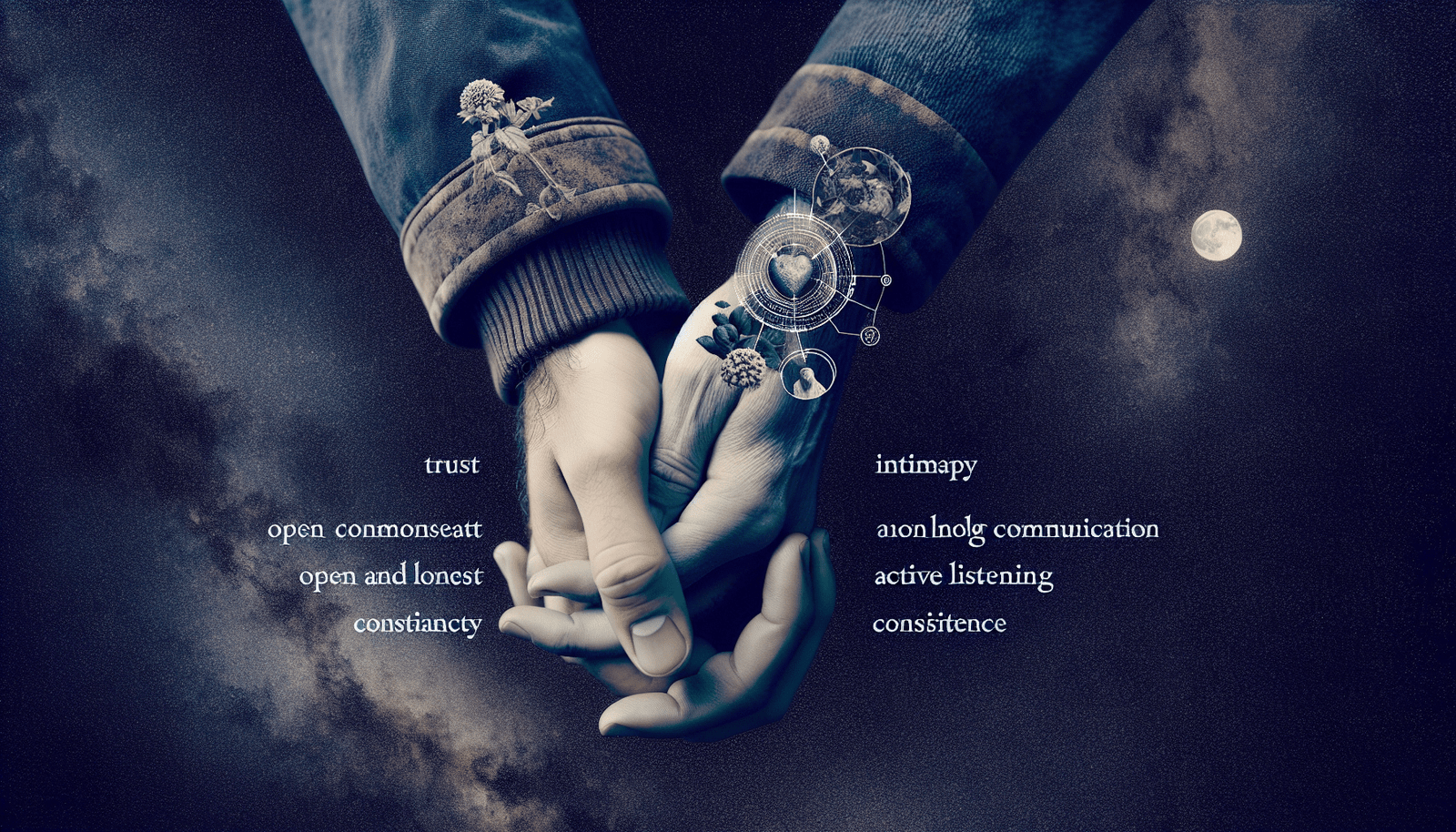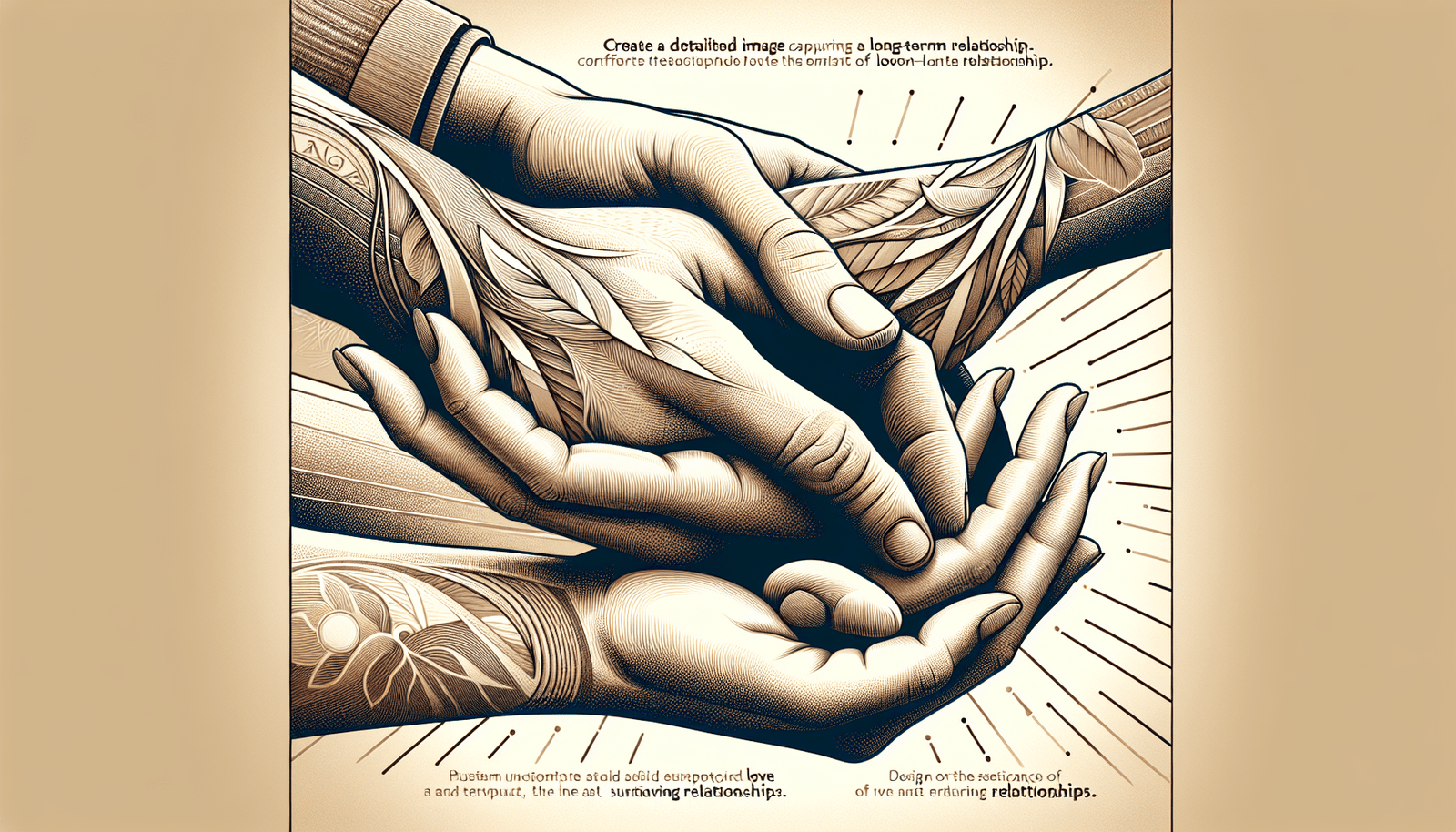Long-Term Relationships
Imagine having a companion by your side, someone who understands you without words and supports you no matter what. That’s what long-term relationships are all about – the deep connection and unwavering support that comes from years spent together. In this article, we will explore the beauty and challenges of long-term relationships and how they can enrich our lives. Get ready to discover the secrets of building and maintaining a lasting bond with your loved one. So, buckle up and get ready for an exciting journey into the world of long-term relationships.
Communication
Communication is the foundation of any successful and long-lasting relationship. It is the key to understanding each other, resolving conflicts, and building a strong connection. Developing effective communication skills is crucial for maintaining a healthy and thriving relationship.
Developing effective communication skills
In order to develop effective communication skills, it is essential to prioritize active listening and empathy. Active listening means paying full attention to your partner when they are speaking, without interrupting or forming judgments. It involves giving your undivided attention and showing genuine interest in what they have to say.
Empathy, on the other hand, is the ability to understand and share the feelings of your partner. It requires putting yourself in their shoes and acknowledging their emotions. By practicing empathy, you can better understand their perspective and respond in a compassionate and supportive manner.
Active listening and empathy
Active listening and empathy go hand in hand. When you actively listen to your partner and show empathy, you create a safe space for open and honest communication. This allows both of you to express your thoughts and feelings freely, without the fear of being judged or misunderstood.
Active listening involves not only hearing the words being spoken but also paying attention to non-verbal cues, such as body language and facial expressions. It requires being fully present in the conversation and avoiding distractions like phones or television. By actively listening, you validate your partner’s emotions and make them feel heard and understood.
Conflict resolution
Conflict is a natural part of any relationship. It’s how you handle conflicts that can make or break a long-term relationship. Conflict resolution involves finding a mutually agreeable solution that addresses the needs and concerns of both partners.
When conflicts arise, it’s important to approach them with an open mind and a willingness to listen and understand. Avoid blaming or attacking your partner, and instead focus on expressing your feelings and needs in a calm and respectful manner. Remember, it’s not about winning an argument, but finding a resolution that strengthens your relationship.
Trust and Honesty
Trust and honesty are the pillars of a strong and lasting relationship. Building trust takes time and effort, but it’s worth every moment invested. Being open and honest with each other creates a safe and secure foundation for your relationship to thrive.
Building trust over time
Trust is not something that can be established overnight. It is built over time through consistent actions that demonstrate reliability and integrity. Keep your promises, be dependable, and follow through on commitments. By doing so, you establish a track record of trustworthiness that strengthens the bond between you and your partner.
Being open and honest
Honesty is an essential component of trust. It means being truthful with your partner, even when it’s difficult or uncomfortable. Avoid keeping secrets or withholding information, as this erodes trust and can lead to misunderstandings and resentment. Instead, communicate openly and authentically, sharing your thoughts, feelings, and concerns with each other.
Maintaining trust through actions
Trust is not a one-time achievement, but an ongoing commitment. It requires consistent effort and action to maintain. Act in ways that reinforce and build upon the trust you have already established. Avoid behaviors that may undermine trust, such as lying, cheating, or breaking promises. By staying true to your word and being reliable, you cultivate an atmosphere of trust and security within your relationship.
Support and Understanding
Support and understanding are vital elements of a healthy and fulfilling long-term relationship. Both partners should feel supported emotionally, mentally, and physically.
Providing emotional support
Emotional support is about being there for your partner during both good times and bad. It involves offering reassurance, encouragement, and a listening ear when your partner is going through challenges or experiencing strong emotions. Validate their feelings, empathize with their struggles, and provide a safe space for them to express themselves without judgment.
Understanding each other’s needs
Understanding your partner’s needs is crucial for providing the support they require. Take the time to learn about their preferences, aspirations, and fears. Ask questions, listen attentively, and encourage open and honest communication. By understanding each other’s needs, you can offer the right kind of support that fosters growth and happiness in your relationship.
Being there for each other
Being present and available for your partner is a fundamental aspect of support. Whether it’s celebrating their achievements, comforting them during difficult times, or simply being a reliable presence in their life, being there for each other strengthens the bond between you. Show up for your partner consistently, and let them know that you are always there to support and uplift them.
Quality Time
Spending quality time together is essential for maintaining a strong and loving long-term relationship. It allows you to create shared experiences, deepen your connection, and prioritize each other amid the busyness of life.
Spending meaningful time together
Quality time is not just about being physically present; it’s about actively engaging with each other and nurturing your relationship. Put away distractions, such as phones or television, and dedicate uninterrupted time for meaningful conversations, shared activities, or simply enjoying each other’s company. By investing time and attention in each other, you solidify the bond you share.
Creating shared experiences
Creating shared experiences helps build a sense of belonging and shared memories. Plan activities or outings that you both enjoy and that allow you to explore new things together. It could be as simple as cooking a meal, going for a hike, or taking a weekend getaway. By sharing experiences, you strengthen your connection and create a reservoir of special moments that you can look back on.
Prioritizing each other
In the midst of busy schedules and responsibilities, it’s important to prioritize each other. Make time in your calendar for regular date nights or dedicated moments to connect with each other. Treat this time as sacred and non-negotiable, as it allows you to reaffirm your commitment and nurture the love and connection you share.
Respect
Respect forms the foundation of a healthy and harmonious long-term relationship. It involves valuing each other’s boundaries, opinions, and ideas, and treating each other with kindness and consideration.
Respecting each other’s boundaries
Respect begins by acknowledging and honoring each other’s boundaries. Understand and respect your partner’s need for personal space, alone time, and privacy. Avoid crossing boundaries without consent, and communicate openly about what is acceptable and comfortable for both of you. Respecting boundaries creates an atmosphere of trust and safety within your relationship.
Valuing opinions and ideas
Everyone has their own opinions and ideas, and it’s important to value and respect each other’s perspectives. Avoid dismissing or belittling your partner’s thoughts, even if you don’t agree with them. Instead, engage in open and respectful discussions, seeking to understand their viewpoint and finding common ground. By valuing each other’s opinions, you foster a greater sense of mutual respect and appreciation.
Treating each other with kindness and consideration
Kindness and consideration are essential aspects of respect in a long-term relationship. Show kindness through small gestures of affection, appreciation, and support. Practice empathy and consider how your words and actions may impact your partner. Treat them with the same consideration and care you would want for yourself. By consistently demonstrating kindness and consideration, you nurture a loving and respectful connection.
Compromise
Compromise is a necessary component of any sustainable long-term relationship. It involves finding common ground, negotiating, and understanding the importance of give and take.
Finding common ground
Finding common ground means seeking areas of agreement to bridge differences and reach mutually satisfying solutions. Identify shared values and goals that can serve as a foundation for compromise. This requires open and respectful communication, where both partners actively listen and consider each other’s perspectives.
Negotiating and finding solutions
When disagreements arise, it’s important to negotiate in a fair and respectful manner. Look for solutions that can satisfy both partners’ needs and expectations. Enhance your problem-solving skills by brainstorming different options, exploring alternatives, and compromising where necessary. The goal is to find a solution that benefits both of you and strengthens your relationship.
Understanding the importance of give and take
Compromise requires acknowledging that relationships involve give and take. It means recognizing that you won’t always get everything you want and being willing to make sacrifices for the greater good of your relationship. Be open to adjusting your expectations and finding middle ground. By understanding the importance of compromise, you foster harmony and balance within your partnership.
Intimacy
Intimacy is a vital element of a fulfilling and satisfying long-term relationship. It encompasses both physical and emotional connections and plays a significant role in deepening the bond between partners.
Physical and emotional intimacy
Physical intimacy involves more than just sexual experiences; it encompasses touch, affection, and closeness. Emotional intimacy, on the other hand, involves sharing your deepest thoughts, desires, and vulnerabilities with your partner. Both forms of intimacy are essential for building a strong and lasting connection.
Maintaining a strong physical and emotional connection requires open and honest communication about your desires, needs, and boundaries. It involves actively showing affection, being receptive to your partner’s advances, and creating a safe space for vulnerability and emotional expression.
Exploring and satisfying each other’s needs
Intimacy is about discovering and satisfying each other’s needs, desires, and fantasies. It requires a willingness to explore and try new things, keeping the spark alive in your relationship. Be open to discussing your individual preferences and fantasies, and work together to find ways to fulfill them. By prioritizing each other’s pleasure and satisfaction, you strengthen the intimate bond you share.
Maintaining a strong connection
Maintaining a strong connection goes beyond physical intimacy. It involves nurturing emotional closeness by regularly checking in with each other, sharing your thoughts and feelings, and actively being present in each other’s lives. Engage in activities that deepen your emotional connection, such as engaging in deep conversations, going on romantic dates, or simply spending quality time together.
Shared Goals and Values
When partners share similar goals and values, it strengthens the foundation of a long-term relationship. Aligning your personal and relationship goals creates a sense of purpose and shared vision for the future.
Aligning personal and relationship goals
Take the time to discuss and align your personal goals with the goals you have for your relationship. Identify areas where your goals align and where you may need to compromise or support each other in pursuit of individual goals. By working together towards shared goals, you build a sense of unity and purpose within your relationship.
Sharing similar values and beliefs
Shared values and beliefs provide a moral compass for your relationship. They guide your decisions, actions, and expectations. Discuss and explore your values and beliefs with your partner, noting areas of agreement and potential differences. Be open to compromise and finding common ground in areas where your values may differ. By sharing similar values, you create a strong foundation for trust, understanding, and support.
Working together towards a common future
A long-term relationship is a journey that requires both partners to actively participate and contribute to creating a common future. Regularly revisit your shared goals and adjust them as necessary to reflect your evolving aspirations. Work together as a team, supporting and encouraging each other to achieve your shared vision. By working towards a common future, you solidify your commitment and create a sense of stability and growth within your relationship.
Independence
Maintaining a sense of individuality and independence is important in any long-term relationship. It allows each partner to grow and pursue their personal interests, while still fostering a strong bond of togetherness.
Maintaining individuality
It’s essential to maintain your sense of individuality in a long-term relationship. Continue pursuing your hobbies, interests, and goals, even as you build a life together. Embrace your uniqueness and encourage your partner to do the same. By maintaining individuality, you bring a sense of freshness and excitement to your relationship and ensure personal growth and fulfillment.
Supporting personal growth
Supporting each other’s personal growth is key to a healthy and lasting relationship. Encourage and celebrate your partner’s achievements, and offer assistance, advice, and motivation when needed. Allow each other the space and freedom to explore new opportunities and pursue personal development. By supporting personal growth, you foster a sense of empowerment and fulfillment within your relationship.
Balancing autonomy with togetherness
Balancing autonomy with togetherness is an ongoing process in a long-term relationship. It involves finding the right balance between independence and interdependence. Respect each other’s need for personal space and alone time, while also nurturing a sense of togetherness and shared experiences. By striking this delicate balance, you create a relationship that allows for both individual growth and deep connection.
Adaptability
Adaptability is essential for long-term relationships to thrive. Life is full of changes and challenges, and being able to adjust and grow together is crucial for maintaining a strong and resilient relationship.
Being flexible to changes
Life brings unexpected twists and turns, and being flexible and adaptable is key to navigating these changes together. Be open to new experiences, ideas, and circumstances. Embrace change as an opportunity for growth and learning. By being flexible, you show resilience and create a foundation for navigating the challenges that arise.
Adjusting to life’s challenges
Life’s challenges can put a strain on any relationship. It’s important to face these challenges together, supporting and encouraging each other along the way. Communicate openly, explore potential solutions, and be willing to adjust your expectations and plans. By working together to overcome challenges, you build a bond that can withstand the trials of life.
Growing and evolving together
Change is inevitable, and as individuals, you will grow and evolve over time. Embrace personal growth and share these experiences with your partner. Encourage each other to pursue new interests, learn new skills, and explore personal development. Growing and evolving together allows your relationship to thrive as you navigate the ever-changing landscape of life.
In conclusion, a long-term relationship requires a combination of different elements, including effective communication, trust, support, quality time, respect, compromise, intimacy, shared goals and values, independence, adaptability, and more. By consciously nurturing these aspects, you can cultivate a strong and fulfilling partnership that stands the test of time. Remember, building a long-lasting relationship requires effort, commitment, and a genuine desire to grow together.








